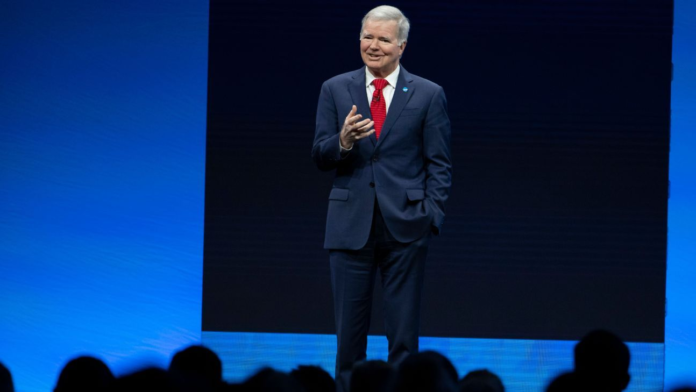INDIANAPOLIS — Outgoing NCAA president Mark Emmert said Wednesday evening he has “very mixed emotions” about ending his 12-year tenure while the college sports industry and its leaders are in the midst of attempting to sort through a barrage of potentially existential issues.
Emmert, who will officially step down from his post as the association’s top executive at the end of February, was the first witness called on Wednesday in a civil court trial to determine if the NCAA holds legal responsibility for the death of a former Division II quarterback who suffered a concussion while playing college football. It is the second concussion-related trial for the NCAA in the past three months, and one of several ongoing legal issues that have made Emmert and the association regular visitors to courtrooms during the tail end of his NCAA presidency.
The NCAA is also facing a number of legal challenges aimed at making college athletes into employees of their schools or providing other avenues for them to share in more of the profits they help to generate.
“I look at all these challenges and complexities and I’m going to miss that,” Emmert told ESPN. “I like those, and I’d love to be someone who helps untangle them. On the other hand, I think it’s the right time to make a change.”
The NCAA announced earlier this month that former Massachusetts Gov. Charlie Baker would take Emmert’s position starting in March. Emmert said that he played no role in selecting his successor, but that he was “delighted” that the NCAA’s Board of Governors hired Baker.
Baker recently finished an eight-year term as governor, and Emmert said he has been giving Baker some time to recharge rather than trying to work with him to ease the transition of leadership. He said Baker’s political acumen will be an important asset for the association during a period in which they are asking for Congress to help solve some of their legal issues.
“It’s critically important,” Emmert said. “I’m sure that’s part of what the board loved about him. He’ll be able to move in that world very well.”
NCAA board members have publicly asked Congress to create federal laws that would clearly state that athletes aren’t employees of their schools and also provide an antitrust exemption that would allow NCAA members to regulate the evolving marketplace for endorsement deals that has reshaped the economics of college sports in the last two years.
Emmert said turning to Congress was a “last resort.” He feels that while passing some form of NCAA rules years ago to regulate the name, image and likeness endorsement market would have put college sports in a better position than the place in which it currently sits, there was no way that he or the association could have avoided the need to turn to Capitol Hill for help.
“It was inevitable,” he said.
Wednesday’s court appearance marked what will likely be the final time that Emmert is compelled to testify under oath about the NCAA’s responsibility for its athletes’ health. He told the Indianapolis jury that the association has a “moral obligation” to support the health and well-being of college athletes, but that legally the NCAA was not responsible for any injuries that athletes suffer while playing sports in school.
The case was filed by the widow of Cullen Finnerty, who won three national championships and 51 total games as the starting quarterback at Grand Valley State University in the early 2000s. Finnerty died in May 2013 at age 30 after going missing on a fishing trip with his wife’s family.
Attorneys for Finnerty’s widow argued that the NCAA has known about the potential long-term brain injuries that can result from concussions and sub-concussive blows to the head since the 1930s and say the organization shirked a duty to its athletes by not warning them about those dangers. They say that Finnerty developed an addiction to opioid painkillers and other health problems due to chronic traumatic encephalopathy or CTE — a degenerative brain disease linked to concussions.
NCAA lawyers said in their opening arguments Wednesday that Finnerty’s death was not related to his time as a college football player, and that individual schools — rather than the NCAA — are responsible for medical care provided to athletes.
The NCAA won a similar lawsuit filed by the widow of former USC linebacker Matthew Gee in November 2022. The organization under Emmert’s watch also agreed to spend $75 million to settle a class-action concussion lawsuit. That money is used for a medical monitoring program for athletes and concussion-related research.
If the NCAA is found to be legally responsible for the long-term effects of head injuries that occur during college sports contests, it could pose a significant financial threat to the association. The NFL, by comparison, has paid nearly $1 billion to former players or their families to settle similar claims about head injuries in recent years.
Emmert declined to answer any questions about the current case or the magnitude of the threat that concussion lawsuit poses to the NCAA.
NCAA president Mark Emmert has ‘very mixed emotions’ on end of tenure
LEAVE A REPLY
Recent Comments
on Iowa State starting RB Jirehl Brock among latest college football players charged in gambling probe
on The Rev. Al Sharpton to lead protest after Florida governor’s ban of African American studies course
on Sports World Hails ‘Superwoman’ Lindsey Vonn for Her Grand Comeback Despite Career-Changing Injury
on San Mateo County Community College District sues five companies over role in ‘pay to play’ scandal
on Saipan, placid island setting for Assange’s last battle, is briefly mobbed – and bemused by the fuss
on ‘Pokémon Scarlet’ and ‘Violet’ Fan Theories Suggest Legendary Time Travel, Alternate Dimension Plot
on Joe Manchin and Tommy Tuberville introduce bill on name, image and likeness rules for college sports
on Inside the Michael Jordan ‘Air’ movie, plus why NFL, others are buying into the sports film industry
on If you’re a frequent traveler, these wrap tops from Aday will revolutionize your on-the-go wardrobe
on How Does Jack Nicklaus Travel? Exploring the Private Jets Owned by the ‘Golden Bear’ Over the Years
on Hollywood Reporter: Tom Cruise negotiated with movie studios over AI before the actors strike began
on Ford Blue Cruise: US regulators investigate fatal crashes involving hands-free driving technology
on Dozens of boats cruise the Seine in a rehearsal for the Paris Olympics’ opening ceremony on July 26
on Devout athletes find strength in their faith. But practicing it and elite sports can pose hurdles
on Despite strong Lunar New Year holiday data, consumer spending in China isn’t roaring back just yet
on David and Victoria Beckham so ‘Charmed’ by Tom Cruise They Have His Photos on Display at Their Home
on CONCEPT ART: New Details Revealed for Disney Cruise Line Lookout Cay at Lighthouse Point Destination
on CBS Sports announces Matt Ryan will join NFL studio show. Longtime analysts Simms and Esiason depart
on Boston College vs. Army live stream, how to watch online, CBS Sports Network channel finder, odds
on Boise State vs. Air Force live stream, odds, channel, prediction, how to watch on CBS Sports Network
on Biden to tout bill’s prescription drug prices, energy provisions in pitch to Americans, aide says
on After UFC Fallout, Conor McGregor Offers a Valuable Piece of Advice to Free Agent Francis Ngannou
on 2024 Super Bowl: CBS Sports Network and CBS Sports HQ to combine for 115 hours of weeklong coverage
on ‘Best Intention’: Chris Kirk Has Absolute Trust in Jay Monahan and PGA Tour’s Widely Debated Model
on 2023 NFL All-Rookie Team: CBS Sports draft expert, former GM unveil league’s best first-year players
on “Completely Knocked Me Out”: Rob Lowe Recalls Boxing Match With Tom Cruise On 1983 Brat Pack Classic
on CONCEPT ART: New Details Revealed for Disney Cruise Line Lookout Cay at Lighthouse Point Destination
on “Completely Knocked Me Out”: Rob Lowe Recalls Boxing Match With Tom Cruise On 1983 Brat Pack Classic
on CBS Sports announces Matt Ryan will join NFL studio show. Longtime analysts Simms and Esiason depart
on Carlos Sainz’s Soccer Fanboy Emerges as Spaniard Shares Defining Moment With This Real Madrid Legend
on Biden: ‘At this point I’m not’ planning to visit East Palestine, Ohio, after toxic train derailment
on ‘Best Intention’: Chris Kirk Has Absolute Trust in Jay Monahan and PGA Tour’s Widely Debated Model
on Ahead of big sports weekend, dispute with Disney leaves millions of cable subscribers in the dark
on A heavy wave of Russian missile attacks pounds areas across Ukraine, killing at least 4 civilians
on 2024 Super Bowl: CBS Sports Network and CBS Sports HQ to combine for 115 hours of weeklong coverage
on 2023 NFL All-Rookie Team: CBS Sports draft expert, former GM unveil league’s best first-year players
on Army vs. Coastal Carolina live stream, how to watch online, CBS Sports Network channel finder, odds
on AL Rookie of the Year Julio Rodriguez Spreads Joy and Sportsmanship to the Youth of Loma de Cabrera
on After UFC Fallout, Conor McGregor Offers a Valuable Piece of Advice to Free Agent Francis Ngannou
on Dubai International Airport sees 41.6 million passengers in first half of year, more than in 2019
on Devout athletes find strength in their faith. But practicing it and elite sports can pose hurdles
on Despite strong Lunar New Year holiday data, consumer spending in China isn’t roaring back just yet
on Dave Portnoy: Taylor Swift’s security should ‘drag Kim Kardashian to jail’ if she attends Eras Tour
on CONCEPT ART: New Details Revealed for Disney Cruise Line Lookout Cay at Lighthouse Point Destination
on “Completely Knocked Me Out”: Rob Lowe Recalls Boxing Match With Tom Cruise On 1983 Brat Pack Classic
on CBS Sports, Serie A announce new TV rights deal; Paramount+ to air over 400 Italian soccer matches
on Cam Newton’s Violent Public Incident Draws Hilarious Reaction From 3x All-Star: “Where Do I Sign Up
on Boston College vs. Army live stream, how to watch online, CBS Sports Network channel finder, odds
on Angel Reese Launches Foundation Dedicated To Empowering Women Through Sports & Financial Literacy
on A weaker dollar, skyrocketing prices and ‘record’ visitor numbers: Good luck in Europe this summer





Your positivity and optimism are contagious It’s evident that you genuinely care about your readers and their well-being